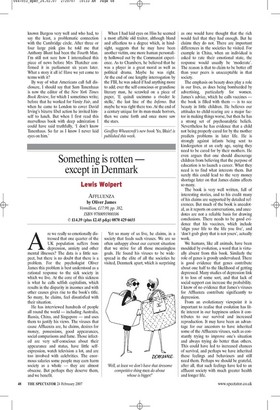Something is rotten except in Denmark
Lewis Wolpert AFFLUENZA by Oliver James Vemallion, £17.99, pp. 382, ISBN 9780091900106 £1439 (plus £2.45 p&p) 0870 429 6655 Are we really so emotionally distressed that one quarter of the UK population suffers from depression, anxiety and other mental illnesses? The data is a little suspect, but there is no doubt that there is a problem. For the psychologist Oliver James this problem is best understood as a rational response to the sick society in which we live. At the core of this sickness is what he calls selfish capitalism, which results in the disparity in incomes and with other causes gives rise to the book's title. So many, he claims, feel dissatisfied with their situation.
He has interviewed hundreds of people all round the world — including Australia, Russia, China, and Singapore — and uses them to justify his views. The viruses that cause Affluenza are, he claims, desires for money, possessions, good appearances, social comparisons and fame. Those infected are very self-conscious about their appearance and status, have little selfexpression, watch television a lot, and are too involved with celebrities. The enormous salaries some people may earn harm society as a whole — they are almost obscene. But perhaps they deserve them, and we benefit.
Yet so many of us live, he claims, in a society that feeds such viruses. We are so often unhappy about our current situation that we strive for all those meaningless goals. He found his viruses to be widespread in the elite of all the societies he visited, Denmark apart, which is surprising as one would have thought that the rich would feel that they had enough. But he claims they do not. There are important differences in the societies he visited. For example in China, when an individual is asked to rate their emotional state, the response would usually be 'moderate'. The reason is that to claim to be better off than your peers is unacceptable in that society.
The emphasis on beauty does play a role in our lives, as does being bombarded by advertising, particularly for women. James's advice, which he calls vaccines — the book is filled with them — is to see beauty in little children. He believes our attitudes to child-rearing are a major factor in making things worse, but then he has a strong set of psychoanalytic beliefs. Nevertheless he has evidence that a child not being properly cared for by the mother predicts problems in later life. He is strongly against infants being sent to kindergarten at an early age, saying they need to be cared for by their mothers. He even argues that one should discourage children from believing that the purpose of education is to launch a career. What they need is to find what interests them. But surely this could lead to the very money shortage later on that James claims affects so many.
The book is very well written, full of interesting stories, and to his credit many of his claims are supported by detailed references. But much of the book is anecdotal, as it reports on conversations, and anecdotes are not a reliable basis for drawing conclusions. There needs to be good evidence that his vaccines, which include 'align your life to the life you live', and 'don't grab glory that is not yours', actually work.
We humans, like all animals, have been moulded by evolution, a word that is virtually absent from this book. Similarly the role of genes is grossly undervalued. There is good evidence that genes contribute about one half to the likelihood of getting depressed. Many studies of depression link it to loss of some sort, and that lack of social support can increase the probability. I know of no evidence that James's viruses for Affluenza contribute significantly to depression.
From an evolutionary viewpoint it is important to realise that evolution has little interest in our happiness unless it contributes to our survival and increased reproduction. It may have been an advantage for our ancestors to have inherited some of the Affluenza viruses, such as constantly trying to improve one's situation and always trying do better than others. This could have led to increased chances of survival, and perhaps we have inherited these feelings and behaviours and still need them. Perhaps we should be grateful, after all, that such feelings have led to an affluent society with much greater health and longer life.






















































 Previous page
Previous page